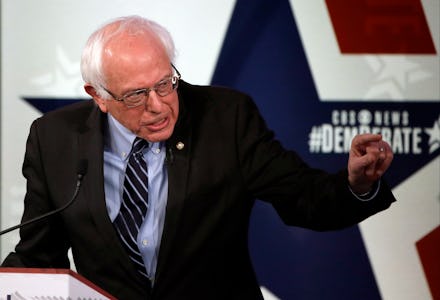Bernie Sanders: "I'm Not That Much of a Socialist Compared to Eisenhower"

Vermont Sen. Bernie Sanders may have become the Republican Party's favorite punching bag for his long-held socialism, but during Saturday night's Democratic presidential debate in Iowa, he made it clear he views his political philosophy as anything but radical.
As frequently occurs with Sanders, whose focus on economic inequality has sparked an electric level of support for the candidate, the focus of the debate turned to his ambitious plans to raise taxes on the wealthiest Americans to pay for a proposed expansion of the country's social welfare network. When CBS debate moderator and congressional correspondent Nancy Cordes asked Sanders about his tax plan for the wealthiest income-earners in the United States, she didn't mince words when it came to its relative extremism. "You've said before that you'd go above a 50% [marginal tax rate] — how high?"
"We haven't come up with an exact number yet, but it will not be as high as the number under Dwight D. Eisenhower, which was 90%," Sanders responded. "I'm not that much of a socialist compared to Eisenhower."
Eisenhower, a Republican president and contemporary conservative icon, hardly cuts the image of a tax-and-spend liberal in the eyes of most of Sanders' more conservative critics. Sanders has been keen to use the tax rate in effect under the president, who served during the economic boom times of the 1950s, as proof positive that his stance on taxation doesn't make "Comrade Bernie" anymore a Communist than they did Eisenhower.
Sanders was even more succinct in his stance on increased marginal tax rates in a conversation with journalist John Harwood in May. When Harwood asked if Sanders' hypothetical top marginal rate of 90% was "obviously too high," Sanders had a single-word answer: "No."
Watch Sanders' Eisenhower answer below: